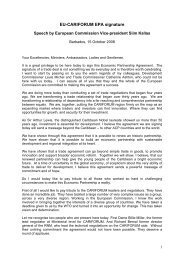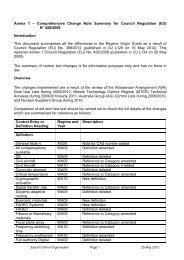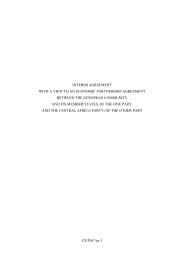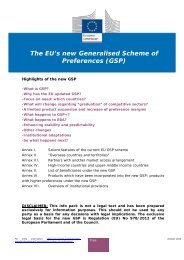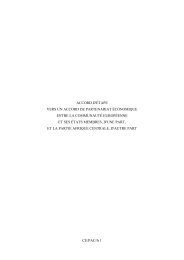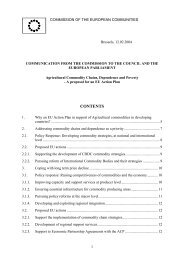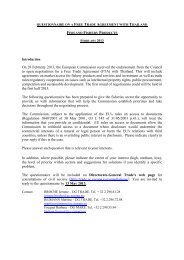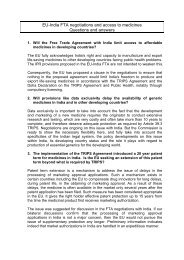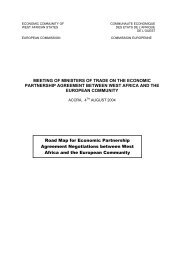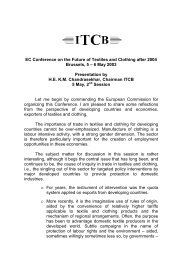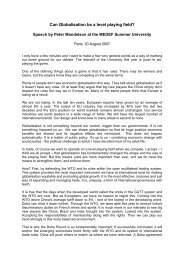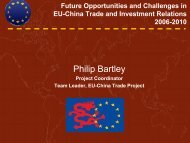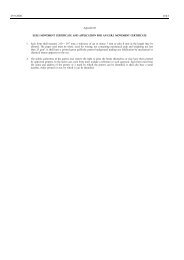Report on the Implementation of the derogation to ... - Trade Websites
Report on the Implementation of the derogation to ... - Trade Websites
Report on the Implementation of the derogation to ... - Trade Websites
Create successful ePaper yourself
Turn your PDF publications into a flip-book with our unique Google optimized e-Paper software.
Final <str<strong>on</strong>g>Report</str<strong>on</strong>g><br />
RoO Derogati<strong>on</strong> under <strong>the</strong> PACP-IEPA<br />
Provided compliance with existing and new management measures is good, and current effort levels<br />
in both <strong>the</strong> purse seine and l<strong>on</strong>gline fisheries can be reduced, <strong>the</strong> impact <strong>of</strong> derogati<strong>on</strong> <strong>on</strong> s<strong>to</strong>ck<br />
sustainability in <strong>the</strong> future is likely <strong>to</strong> c<strong>on</strong>tinue <strong>to</strong> be minimal.<br />
IUU fishing<br />
M<strong>on</strong>i<strong>to</strong>ring, c<strong>on</strong>trol and surveillance (MSC) capability at <strong>the</strong> regi<strong>on</strong>al, sub-regi<strong>on</strong>al and, in <strong>the</strong> case <strong>of</strong><br />
PNG, nati<strong>on</strong>al level is well developed and c<strong>on</strong>tinues <strong>to</strong> streng<strong>the</strong>n. There is little evidence <strong>of</strong> IUU<br />
fishing in <strong>the</strong> WCPO purse seine fishery, with most issues relating <strong>to</strong> in-z<strong>on</strong>e infracti<strong>on</strong>s.<br />
As tighter MCS c<strong>on</strong>trols are introduced and enhanced management measures adopted, pressure <strong>to</strong><br />
infringe, particularly with respect <strong>to</strong> closed high seas areas, time period closures and fishing method<br />
restricti<strong>on</strong>s may increase. This additi<strong>on</strong>al pressure <strong>on</strong> MCS schemes will be exacerbated by increased<br />
pressure <strong>on</strong> relatively static raw material supplies, given WCPO catch levels are expected <strong>to</strong> remain<br />
stable. Provided MSC activities c<strong>on</strong>tinue <strong>to</strong> be well resourced and well coordinated across <strong>the</strong><br />
regi<strong>on</strong> according <strong>to</strong> agreed strategies, both within EEZs and <strong>on</strong> <strong>the</strong> high seas, any impacts <strong>of</strong><br />
derogati<strong>on</strong> <strong>on</strong> IUU fishing should be limited.<br />
A recent review indicated that PNG has effectively implemented <strong>the</strong> EU-IUU Fishing Regulati<strong>on</strong>. This<br />
additi<strong>on</strong>al requirement for EU market access has not limited <strong>the</strong> supply <strong>of</strong> compliant raw material<br />
for processing in PNG plants, o<strong>the</strong>r than in <strong>the</strong> case <strong>of</strong> Vanuatu-flagged vessels.<br />
SPS compliance<br />
To date, global sourcing has had little or no direct impact <strong>on</strong> PNG processors, with adequate supplies<br />
<strong>of</strong> originating fish <strong>to</strong> meet prior and current needs. Catches within archipelagic waters have been<br />
close <strong>to</strong> 100,000 mt in recent years, while PNG’s canneries have required around 60,000-70,000 mt.<br />
Also, <strong>the</strong> requirement for compliance <strong>of</strong> this supply with <strong>the</strong> EU’s Sanitary and Phy<strong>to</strong>sanitary (SPS)<br />
Regulati<strong>on</strong> has not been a c<strong>on</strong>straint thus far, with an adequate number <strong>of</strong> SPS-compliant vessels <strong>to</strong><br />
meet <strong>the</strong> necessary raw material supply.<br />
In <strong>the</strong> short <strong>to</strong> medium term, as additi<strong>on</strong>al processing plants come <strong>on</strong> stream, global sourcing will<br />
need <strong>to</strong> be exercised <strong>to</strong> a much greater degree for new plants <strong>to</strong> acquire sufficient SPS-compliant<br />
raw material for processing and export <strong>to</strong> <strong>the</strong> EU. However, <strong>the</strong> issue may not be that <strong>the</strong> number<br />
<strong>of</strong> vessels with SPS certificati<strong>on</strong> is inadequate, given that in 2010, over 750,000 mt <strong>of</strong> WCPO fish was<br />
likely caught by vessels with SPS certificates. Ra<strong>the</strong>r, <strong>the</strong> issue may be <strong>the</strong> availability <strong>of</strong> SPS<br />
compliant fish <strong>to</strong> PNG processors. Global sourcing notwithstanding, <strong>the</strong>re is currently little <strong>to</strong> no<br />
incentive for fleets <strong>to</strong> <strong>of</strong>fload <strong>to</strong> PNG plants (existing or potential plants) if those vessels/fleets have<br />
no links <strong>to</strong> PNG <strong>on</strong>shore investments. Even where vessels do have links <strong>to</strong> <strong>on</strong>shore plants,<br />
significant quantities <strong>of</strong> fish are <strong>of</strong>ten transhipped and exported, ra<strong>the</strong>r than <strong>of</strong>floaded <strong>to</strong> processing<br />
facilities. PNG will need <strong>to</strong> c<strong>on</strong>sider arrangements <strong>to</strong> guarantee supply <strong>to</strong> proposed future plants<br />
(e.g. compulsory <strong>of</strong>floading a porti<strong>on</strong> <strong>of</strong> catch by licensed vessels, in combinati<strong>on</strong> with preference<br />
given <strong>to</strong> licensing SPS-compliant vessels <strong>to</strong> fish in PNG waters). The present requirements for vessels<br />
fishing under existing arrangements <strong>to</strong> supply fish <strong>to</strong> <strong>on</strong>shore plants may need <strong>to</strong> be tightened up or<br />
enforced.<br />
A sec<strong>on</strong>d SPS-related issue for PNG relates <strong>to</strong> <strong>the</strong> status <strong>of</strong> its Competent Authority (CA). Issues with<br />
<strong>the</strong> CA itself and <strong>the</strong> certificati<strong>on</strong> <strong>of</strong> vessels and plants were identified by DG SANCO’s Food and<br />
Veterinary Office in 2007 and 2008, and <strong>the</strong> CA was fur<strong>the</strong>r examined in 2009. While best efforts<br />
have made <strong>to</strong> rectify <strong>the</strong> deficiencies identified, it is still not certain if full compliance has been<br />
Linpico s.a.r.l. Page 4




